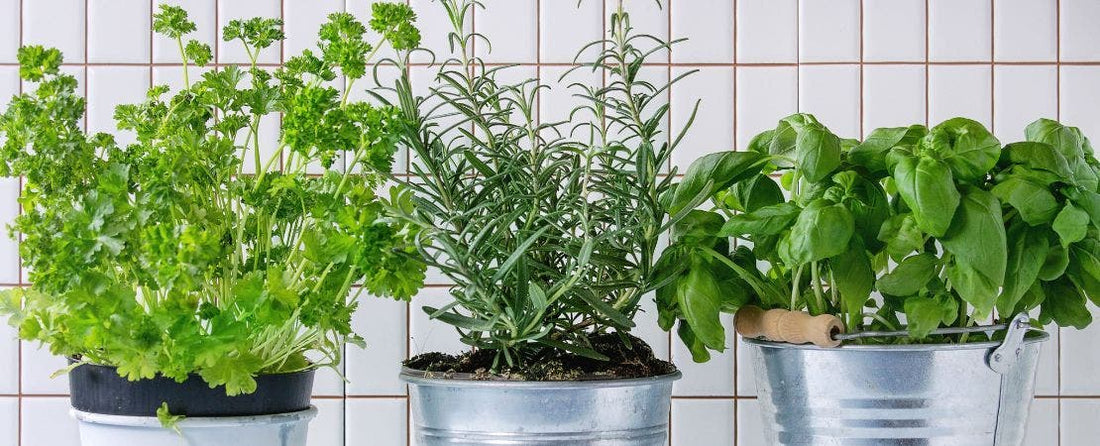
4 Easy Herbs to Grow: Get Started With These Easy Herbs
Share
Try Growing Herbs to Bolster Your Gardening Confidence
Is the price of prime rib competing with your fresh herb budget? You know your fresh tomato sauce won’t be as mouthwatering with the meager taste of dried basil from the grocery’s spice section. And you really had your heart set on serving your famous mint julep tea at your backyard barbeque.
You know you could grow fresh herbs from seed. You could have a year’s worth of fresh herbs for less than the cost of seared steak with rosemary. But perhaps your drooping Peace Lily in the corner of the living room has you doubting your green thumb.
Stock up on gardening supplies. Because if you think your gardening chops aren’t up to par with your cooking skills, we have a list of 4 herbs that are easy to grow from seed.
Basil
Basil is an annual, which is one of the reasons it’s best grown from seeds. Start your herb seeds inside six weeks before the last frost. And don’t plant outside until nighttime temperatures are at least 50 degrees. You can grow basil in a container. But your container basil will grow best if you place it outdoors during the summer.
Grow basil in a sunny spot with sandy soil. Basil prefers moist soil that drains well. Mulch will help the soil retain moisture if you live in a dry area.
When growing basil, have your recipes handy; frequent pruning will increase your harvest. Prune any shoots that are developing flowers to keep your basil tasting best.
Basil keeps well in the freezer. Simply put your fresh-cut leaves in a plastic bag and place immediately in the freezer.
Oregano
A Mediterranean herb like basil, oregano is best grown in a spot that gets at least six hours of full sun and has sandy soil.
You can grow oregano seedlings by planting seeds on the surface of peat-free seed compost. Water well and cover the container with clear plastic to keep the seeds warm. Place on a sunny windowsill. Plant the seedlings after the last frost in a sunny location with good drainage.
You can encourage growth by cutting the plant back in the middle of summer. Frequently harvesting oregano will improve its flavor.
Oregano is a perennial (Zones 4-10) and will grow back each season.
Parsley
Parsley is a biennial, meaning it will live for about two years. Cover your parsley beds in the winter to protect their roots.
Parsley can be grown from seed indoors to transplant outside after the frost. Soak parsley seeds for about two hours before planting to encourage germination. Like the rest of your seeds, cover parsley seeds to keep them warm and place them near a sunny window.
Plant parsley outside in a sunny location with good drainage. Parsley likes moist soil, but be careful to not overwater to prevent root rot. Using mulch will help keep the soil moist between waterings.
When harvesting parsley, cut the outer stems. Leave the main stem to allow the plant to mature.
Mint
Mint seeds can be started indoors or planted outside after the last frost.
A perennial, your mint will grow delicious leaves every season if it is well-cared for. Like your other perennial or biennial herbs, mint should be covered with a thick layer of mulch over the winter.
Mint is one of the few herbs that prefers partial shade and moist soil. Mint grows and spreads quickly. Harvest frequently or plant in a container to prevent mint from overtaking your garden.
Herb-Growing Tips
- Nearly all herbs grow best with a minimum of six hours of full sun.
- Herbs have shallow roots and will not grow well in soggy, wet soil. If your soil doesn’t drain well, then plant your herbs in a raised bed or use containers.
- Avoid fertilizing your herbs, as doing so will reduce your plant’s tastiness in your favorite recipes.
- Even though our favorite culinary clippings are collectively known as herbs, each plant has unique needs. Understanding each herb’s requirements for soil condition, sunlight, water and fertilizer will result in better fresh herbs.
Fresh herbs are a great cook’s best-kept secret. Forgo the pesticide-laden herbs in the produce aisle. Instead, growing your own fresh herbs is easy and fun. Check out all of Park Seed’s herbs to add culinary flair to your cooking.



